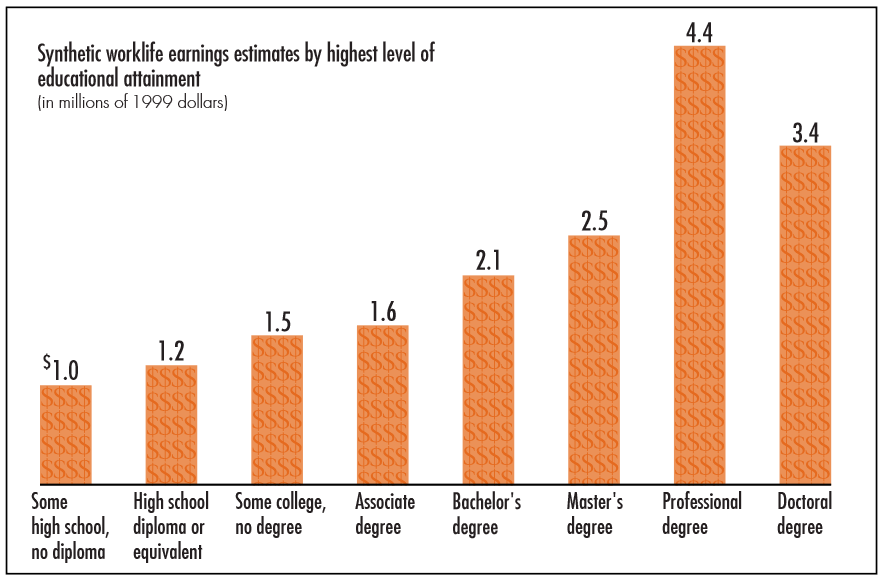
Suppose you wish to become POTUS someday. The job of President of the United States has three Constitutional requirements (Be a U.S. citizen, at least 35 years old, living 14 years as a U.S. resident. Why? Are you really thinking about it?).
Education is not one of them.
Eleven presidents had no college education, one had barely any education at all (Lincoln), and two—two—attended business schools. Only one president, George W. Bush, had a Master’s degree in Business Administration (MBA). In the House of Representatives, 28 hold MBAs. So, if you wish to be POTUS or in Congress, how useful is an MBA? Not very, statistically speaking, but few of us expect our politicians to be business leaders. To measure the worth of an MBA, have your eye on the prize—your chosen career path—and realize the MBA is a tool to achieving that prize.
Employment Rate Based on Education Level
Let's start with minimal expectations. If all you want is security against being jobless, a Master’s Degree is an excellent insulator against the fluctuations of a wavering economy. The Bureau of Labor Statistics (BLS) charts (literally—it’s a chart) these things, and recently told us that the more education you have, the lower your unemployment rate:
- Less than a high school diploma—11 percent unemployment
- High school diploma only—7.5 percent unemployment
- Associate’s degree—5.4 percent unemployment
- Bachelor’s degree—4.0 percent unemployment
- Master’s degree—3.4 percent unemployment
But any MBA student is interested in far more than job security.
Earnings for MBA Graduates
The value of an MBA in purely monetary terms has several measurements. You can look at your Return on Investment (ROI), your median annual income expectations, and your lifetime earning power. Oh, who are we fooling, it doesn’t matter how you look at it—having that MBA can bring you big money.
Some schools offer MBA programs that must come with gold-wrapped chocolates on your pillow every night, because their price tags are outrageous. Bush’s alma mater, Harvard, is $66,348 a year for tuition and fees for its full-time MBA program. You would need to emerge from postgraduate school into the welcoming, wealthy arms of family and generous friends to recoup those costs quickly. Choose a school that fits your budget while still delivering a great MBA experience.
The BLS pegs Master’s degree holders at $1,329 median weekly earnings. A little trick we call math (you learn a lot of great math earning an MBA) gives us an annual median income of $69,108.
Whoa, you say, that MBA came with a hefty price tag, so how much better is that weekly earning rate than the national average? The BLS says the average weekly median income is $827—a full $502 a week lower than the paycheck of an MBA earner.
Let us now look at lifetime earnings. You go to school, get your MBA, and then start earning a good living. How do your earnings compare?
Back in 2002, the BLS measured this, and holders of Master’s degrees earned two and a half times as much in their lifetimes as those who did not graduate high school:
- No high school diploma, 1999 dollars—$1,000,000
- Bachelor’s degree, 1999 dollars—$2,100,000
- Master’s degree, 1999 dollars—$2,500,000
A more recent measure from Payscale, Inc., indicates the 20-year median compensation (excluding stock benefits):
- All Bachelor’s degrees—$1,301,000
- All MBA degrees—$1,771,000
This is a metric of your earning power during the peak earning phase, not the totality, of your career. Any way you measure them, MBAs generate outstanding ROI.
Other Measures of the Worth of an MBA
Not everyone uses dollars to measure things (they’re 6-1/8th inches long, if you wondered), and an MBA brings other benefits. You work among well-educated co-workers, tackling interesting projects, in dynamic, competitive environments leading to more pathways to greater success.
Few MBA holders operate heavy equipment, for example, or harvest crops. They work in comfortable offices, performing fulfilling work:
- Research and develop tactical and strategic solutions to marketing challenges
- Create and present plans to advance a company’s competitive advantage
- Listen to, and respond appropriately, to culturally sensitive issues from customers, employees and competitors
- Seek competitive leverage while maintaining ethical standards
Let’s All Get MBAs
Not every possible career path requires a Master’s in Business Administration. If you want to bake pastries for someone else, get an eminently useful culinary arts diploma. If you want to open your own chain of specialty bake shops, get an MBA. Possible career paths that make the most of an MBA:
- Customer Relationship Management
- Entrepreneurship
- Financial Services
- Healthcare Services
- Information Technology
- Production and Warehouse Management
- Risk Management
- Sales and Marketing
I added a video to a @YouTube playlist http://t.co/TUo16qhjxV Meet Chris, Business Administration Graduate from ECPI University -
— Dominant G00B (@DG00B) August 23, 2015
Should I Get An MBA?
No, not everyone should get an MBA, but for those who do, the ideal first step is to contact ECPI University to learn more about its Master of Business Administration (MBA) program. Delivered 100 percent online, ECPI’s MBA curriculum can work around your schedule, helping you to become an entrepreneur, risk manager, or—perhaps—President of the United States. Call today—it could be the Best Decision You Ever Make!
DISCLAIMER – ECPI University makes no claim, warranty or guarantee as to actual employability or earning potential to current, past or future students or graduates of any educational program we offer. The ECPI University website is published for informational purposes only. Every effort is made to ensure the accuracy of information contained on the ECPI.edu domain; however, no warranty of accuracy is made. No contractual rights, either expressed or implied, are created by its content.
Gainful Employment Information
For more information about ECPI University or any of our programs click here: http://www.ecpi.edu/ or http://ow.ly/Ca1ya.





